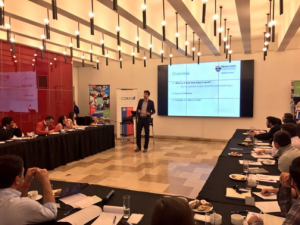Dr Jonathan Kimmitt, a researcher based in Newcastle University Business School, studies social entrepreneurship in emerging economies. Here he talks to Dr Eve Forrest about the recent ESRC IAA project he has been working on with partners in Chile around Social Impact Bonds (SIBs).
EF: What are Social Impact Bonds (SIBs)?
JK: SIBs are a new policy tool for tackling significant social problems as well as the challenges in funding social entrepreneurs and/or other types of social purpose organisations such as charities/NGOs. They began in 2010 when the UK’s Ministry of Justice used them as a policy tool, designed to link the outcomes of social interventions to payments. They have since been used by others to think of new ways to fund social interventions.
EF: Tell me more about the research, what was the context of you doing this particular impact project?
JK: We began the research in 2016 (along with the University of Liverpool) which developed links with partners to understand the structure and diversity of social entrepreneurship in Chile which led to a final project report. We presented these findings to the funders, policy makers, social entrepreneurs which consequently led policy makers in the new formed Chilean government to fund SIBs. It also led to Production Development Corporation (CORFO: an external partner to the project) to re-develop aspects of their entrepreneurship programmes too and the impact project grew from there. The ESRC IAA funding allowed us to follow up these connections hold events, interactive seminars and develop capacity around SIBs as a new policy tool.
EF: What has been the main impacts of the project so far?
The research raised the question of what SIBs may look like in Chile, where the priorities exist for funding and how social entrepreneurs can be prepared for such investments and what learning is transferrable from the UK. Because I had also been involved in the evaluation of a SIB in Newcastle, we were looking to see what could be learnt from that experience. Via the IAA project there has been a large amount of interest from both within Chile and in other parts of the world, with people keeping an eye on how this more experimental approach turns out. As this is a relatively new idea in relation to investment, there were so many unknowns when we began but the project has been positively received which has been a really positive impact. However ideas are just beginning to take hold and the wider impact isn’t quite known yet, this is something the project team will continue to track well into the future.
EF: And the most challenging part of the project?
JK: Like any impact project, the main challenge is keeping track of all different areas that are being developed from businesses and policymakers reading about the research. A key issue is capturing what is being said and done, which is doubly hard when it is not a location where the research teams are based! The Chilean government have been implementing our diagnostic tool around SIBs, so we can capture the information as they get it. We also have close links to our partner CORFO too and we are always finding out new places the research has ended up through them, which is great. The social entrepreneurs in Chile have also been developing impact measurement tools too, so they are our strongest advocates when it comes to thinking of the future of these ideas.
EF: What’s next for the research and the impact project?
JK: The project really wanted to show the potential for the public and private sector to work more closely together to solve social problems. There’s a while to go before that’s a reality but the outcomes of the impact project have been really positive so we want to keep building on that. We are also working on an early rural entrepreneurship project in Chile too, taking this approach into new regions means that the work is always developing, it’s an exciting place to be!
To find out more about the research, see the project website for more information or here, on Jonathan’s page at Newcastle University Business School.


